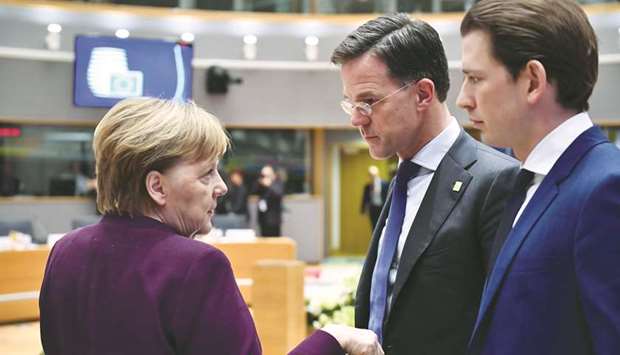Feuding EU leaders made a last ditch push to agree on the bloc’s trillion-euro budget yesterday, with France and Germany pushing “frugals” and big-spenders to find common ground.
After a night of tough talks, leaders and diplomats worked furiously for a second day to reach an agreement for the EU’s seven-year post-Brexit budget, with hopes of a compromise fading as the weekend neared.
The tussle over money is a Brussels ritual, made more intense this time by the departure of Britain from the bloc, which has left a €75bn ($81bn) “Brexit gap” over the 2021-27 period.
“It will certainly take some time, even if it goes well,” Austrian Chancellor Sebastian Kurz told reporters.
“We will make every effort to ensure that an agreement can be reached at this summit,” he added.
Austria is one of the self-styled “frugal four” nations — along with the Netherlands, Sweden and Denmark — who have set themselves against a proposal by summit host Charles Michel, the EU Council president.
They insist Michel’s €1.09tn budget plan is excessive and must be trimmed, while also calling for new priorities away from subsidies for farmers and building motorways.
Leaders are at odds over how much to increase the long-term budget — called the multi-annual financial framework (MFF). They also disagree over how spending should be shifted between priorities and how much each member should pay as a percentage of its gross domestic product (GDP). The last MFF came in at €1.08tn (in 2018 prices).
“My prime minister has been very clear from the start — we will not pick up the tab,” said a diplomatic source from one of the “frugal” countries.
“We are fighting 21st-century challenges with a budget made in the 1980s.”
Against the “frugals” are France, which wants farm payments protected and more money for European defence projects, and the so-called friends of cohesion — a group of eastern and southern countries wanting to ringfence the money they get from the budget.
“A miracle is always in the air, especially in Brussels, but we are very far from the realistic possibility to make a deal,” Hungarian Prime Minister Viktor Orban told reporters, saying he thought it “very likely” another summit would be needed to reach agreement.
Michel met the leaders of the “frugals” along with President Emmanuel Macron of France and German Chancellor Angela Merkel on Friday morning in a bid to find a way out of the deadlock.
France and Germany, the bloc’s most powerful members, then set out to bring all sides together with the council announcing a new meeting of all 27 leaders at 1600 GMT.
At that stage, hard-nosed negotiations could continue or instead, the summit could break up without agreement, forcing leaders to reconvene for another meeting, most likely in April.
The inconclusive late-night tussle on Thursday revealed leaders’ red lines and potential grounds for compromise to Michel, who is tasked with finding consensus.
“I don’t think it is really a question of convincing one group or another.
I think it is a question of agreeing (on whether) we want this ambitious policy in Europe or not?” said Latvian Prime Minister Krisjanis Karins.
Macron, who visits the national farm show in Paris today, said he would “battle” to protect the Common Agricultural Policy (CAP).
“The overall budget total was brutally attacked by the countries of the north, in particular the CAP,” a French diplomatic source said.
In a sign of French sensitivity on the subject, Macron’s agriculture minister suggested in a TV interview that he had secured a victory in protecting the CAP, which was worth €383bn in the current long-term budget.
The claim was swiftly shot down by French diplomats who pointed out that nothing had yet been agreed.
Macron has sought to push the EU to be more united and more ambitious and insisted on Thursday that Britain’s departure should not clip the bloc’s wings.
But his calls for post-Brexit largesse were met with scepticism by the “frugals” and even Finland, whose prime minister said it was time for the EU to be “realistic” with its spending.
Adding yet more discord is the European Parliament, which wants the MFF hiked to €1.32tn to pay for costly goals such as turning the European Union into a carbon-neutral economy within three decades.
Parliament President David Sassoli slammed Michel’s proposal as “a series of cuts”. The European Commission, the EU’s executive arm, which is aiming for greater geopolitical heft under new President Ursula von der Leyen, is trying for a target of €1.13tn.

Angela Merkel, Germany’s chancellor (left), speaks with Mark Rutte, Netherlands’s prime minister, (centre) and Sebastian Kurz, Austria’s chancellor, ahead of roundtable talks at a EU leaders’ summit in Brussels on Thursday. After a night of tough talks, leaders and diplomats worked furiously for a second day to reach an agreement for the EU’s seven-year post-Brexit budget, with hopes of a compromise fading as the weekend neared.
